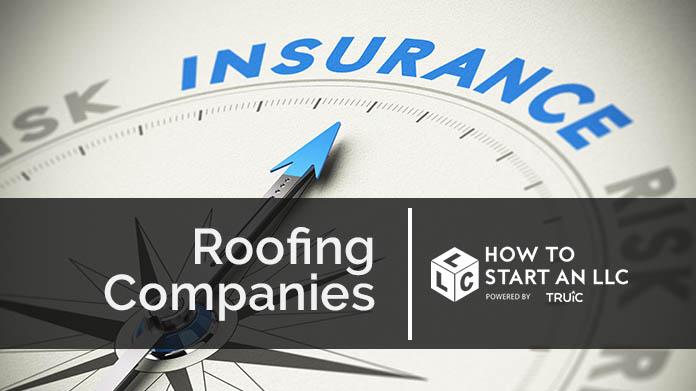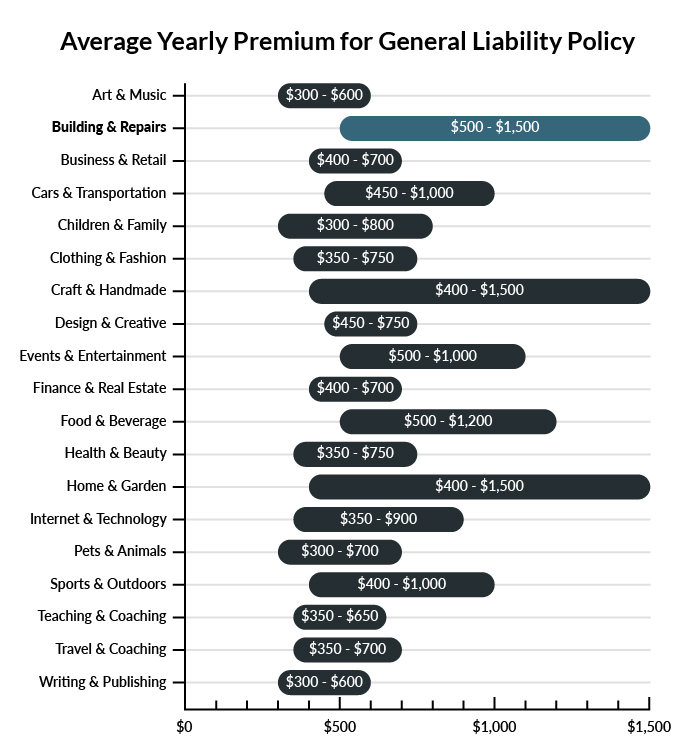Roofing Company Insurance
Getting business insurance for your roofing company is essential.
This is because roofing companies need to be protected against a variety of different risks, such as property damage claims and employee injuries.
You will also need business insurance in order to protect your company from traffic accident-related damages that arise while you or an employee are traveling to a jobsite.
We’ll help you find the most personalized and affordable coverage for your unique business.

Recommended: Ergo Next Insurance is dedicated to matching small businesses with the right policy at the best price.
Best Insurance for a Roofing Company
General liability insurance is — generally speaking — one of the most important insurance policies for roofing companies.
Some of the risks general liability insurance covers are:
- Bodily injury
- Property damage
- Medical payments
- Legal defense and judgment
- Personal and advertising injury
Even so, your roofing company will likely benefit from purchasing additional coverage policies.
This is because a general liability policy will not be able to holistically cover you from all foreseeable risks.
Additional coverage options you will likely benefit from considering include:
- Commercial auto insurance — Covers vehicle damage and/or bodily injury claims that arise as a result of a traffic accident with a company vehicle.
- Commercial property insurance — Protects your company’s commercial roofing equipment in the event of theft or damage.
- Workers’ compensation insurance — Protects you against employment law-related disputes (e.g., wrongful terminations, injuries, etc.).
- Business interruption insurance — Covers part of your lost income in the event that you are required to temporarily stop operating due to a covered risk.
When you start purchasing your business’s coverage, you will need to find the right insurer for your unique needs.
As of 2026, there are two different types of insurers to choose from:
- Online insurers (recommended): Popular examples include Tivly and Ergo Next Insurance.
- Brick and mortar insurers: Popular examples include Nationwide and Hiscox.
Let’s Find the Coverage You Need
The best insurers design exactly the coverage you need at the most affordable price.
Cost of General Liability Insurance
The average roofing company in America spends between $500-$1,500 per year for $1 million in general liability coverage.
Compare the average cost of general liability insurance for a roofing company to other professional industries using the graph below.
Several factors will determine the price of your policy. These include your:
- Location
- Deductible
- Number of employees
- Per-occurrence limit
- General aggregate limit
You may be able to acquire general liability insurance at a discounted rate by purchasing it as part of a business owner’s policy (BOP) rather than as a standalone policy.
A BOP is a more comprehensive solution that includes multiple forms of coverage, such as business interruption and property insurance.

Find the Best Rate
Discover the best coverage at the lowest rate in our low-cost business insurance review.
Common Situations That General Liability Insurance May Cover for a Roofing Company
Example 1: While removing shingles and other existing roofing materials from a home or business in order to install a new roof, one of your roofers accidentally drops a piece of roofing material on a passerby, injuring them. Your general liability insurance may pay the expenses related to the injury claim. If the injury results in a lawsuit, your general liability insurance may help cover court costs and settlement fees or judgments related to the lawsuit.
Example 2: Your roofers failed to adequately lay down tarps in order to catch all the roofing materials, like shingles and nails. As a result, a visitor or occupant of the building stepped on a nail, resulting in a puncture wound that needed medical attention. General liability insurance may help pay for the treatment of the injury as well as any costs associated with a lawsuit.
Example 3: In order to get a closer look at the new roof, the building’s owner climbs a ladder and subsequently falls, resulting in many cuts and scrapes and possibly a broken bone. Your roofing company’s general liability insurance may pay the expenses related to treating the injury. If the injury results in a lawsuit being filed by the owner, insurance may pay all the court-related costs, lawyer fees, and any settlement amounts or judgments that arise.
Other Types of Coverage Roofing Companies Need
While general liability is the most important type of insurance to have, there are several other forms of coverage you should be aware of. Below are some of the most common types of coverage:
Workers’ Compensation Insurance
Most states require businesses to carry workers’ compensation insurance for their part-time and full-time workers. This coverage protects your employees if they become injured at work or fall ill after a work-related accident. It not only covers an employee’s medical bills and lost wages if they need time to recover but also any disability or death benefits stemming from a workplace accident.
Commercial Property Insurance
You made a major investment in the tools, equipment, and supplies needed to run your roofing business. In the event of a fire, theft, or natural disaster, commercial property insurance would cover the cost of repairing or replacing your business-related property.
Commercial Auto Insurance
If you use trucks and other vehicles to transport your equipment and/or employees to job sites, you will need commercial auto insurance in order to cover any accident-related expenses if your work vehicle were to collide with another car or object while being driven.
Installation Coverage Insurance
Installation coverage insurance covers accidental damage to other items while the roof is being installed. For example, if one of your roofers drop a nail gun on a glass outdoor table and the glass is cracked, this insurance would pay for the repair or replacement of the outdoor table.
Commercial Umbrella Insurance
While your general liability insurance policy covers most claims, some accidents or lawsuits may be so catastrophic that they threaten to exhaust the limits of your primary coverage. Commercial umbrella insurance protects you from paying out-of-pocket for any legal fees and awarded damages that exceed your primary policy
Additional Steps To Protect Your Business
Although it’s easy (and essential) to invest in business insurance, it shouldn’t be your only defense.
Here are several things you can do to better protect your roofing company:
- Use legally robust contracts and other business documents. (We offer free templates for some of the most common legal forms.)
- Set up an LLC or corporation to protect your personal assets. (Visit our step-by-step guides to learn how to form an LLC or corporation in your state.)
- Stay up to date with business licensing.
- Maintain your corporate veil.
Roofing Company Insurance FAQ
Yes, absolutely. You will need to first get a quote from an online business insurance provider like Ergo Next Insurance. Ergo Next allows you to then purchase a policy immediately and your coverage will be active within 48 hours.
A typical business owner’s policy includes general liability, business interruption, and commercial property insurance. However, BOPs are often customizable, so your agent may recommend adding professional liability, commercial auto, or other types of coverage to your package depending on your company’s needs.
“Business insurance” is a generic term used to describe many different types of coverage a business may need. General liability insurance, on the other hand, is a specific type of coverage that business owners need to protect their assets.
Yes, you do. This is because — even if it isn’t a legal requirement for you — you will want to ensure that you have purchased your business insurance policies before any liability arises.
In practice, this could end up happening as soon as you begin interacting with clients or hiring staff members.
Not necessarily. Certain exceptions may be written directly into your roofing company insurance policy, and some perils may be entirely uninsurable.
Yes, an LLC is meant to create a legal barrier between your business and your personal assets and credit. If you haven’t formed an LLC yet, use our Form an LLC guide to get started.
An LLC doesn’t protect your business assets from lawsuits and liability– that’s where business insurance comes in. Business insurance helps protect your business from liability and risk.